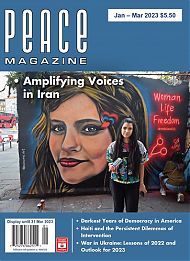Remembering Mary-Wynne Ashford (p.6)
Jonathan Down gave talks in high schools with this charismatic and caring doctor, who co-chaired IPPNW during the Cold War and called upon physicians to prevent nuclear war, for they surely could not treat its victims.
Amplifying Voices in Iran (pp.7-9)
Since the 1979 revolution, all the protest movements in Iran eventually have been crushed, but this one is different. It may succeed, partly because it is being led by women, suggest Katia Evania, Hayley Dick, and Maurice Koetsier.
Kadyrov and Putin vs Gays and Democracy (p.10)
Both Russia and Chechnya have thugs for presidents! Not only are Putin’s and Kadyrov’s troops trying to crush democracy, but their brutal police are persecuting LGBT minorities, reports John Bacher.
Peace Work in a War Zone (pp.11-13)
Felipe Daza and Andre Kamenshikov were peace organizers in Kyiv when the Russian invasion began and have been in touch with Ukrainian peace groups ever since—including ordinary citizens who do not claim to be community organizers of nonviolent action, but only coping with the emergency. Almost none of them are calling for a ceasefire under current conditions.
Who Will Pay for a Global Energy Transition? (pp.14-15)
The rich countries of the north owe the poorer countries a kind of “climate debt,” notes John Feffer, who regards them as obligated to help the south make its own transition to a post-fossil-fuel future.
Cyber Security at the UN General Assembly: Deja vu All Over Again (pp.16-17)
Paul Meyer is disappointed. The US vs Russia conflict keeps spoiling efforts at the United Nations to develop norms governing international cyber security policy. Some 60 member states promoted a “Programme of Action” but unfortunately cannot “fast track” it. It may be endorsed in 2025, though there is no guarantee.
Tree Planting Opportunities (p.18)
Planting trees will not reduce carbon in the atmosphere much for 20 years or more, according to Robin Collins and Bill Bhaneja, who advocate protecting old forests. However, urban trees can help cool us sooner by casting shade, reducing pollutants, and insulating buildings with shrubs and bushes. Fruit and nut trees can feed people too.
Ukraine and Cluster Munitions (p.19)
Earl Turcotte led Canada’s delegation throughout negotiation of the Convention on Cluster Munitions. Now Russia is using those weapons in Ukraine and we hear that Ukraine wants the US to enable them to reciprocate. Turcotte strongly opposes that, reminding us that up to 40 percent of the bombs remain intact and dangerous after the war ends.
Haiti and the Persistent Dilemmas of Intervention (pp.20-22)
Armed gangs are terrorizing Haiti, Timothy Donais reports, adding that previous efforts to help with the country’s crisis have all failed. One or two countries cannot fix the problem, but the U.N. is unlikely to send peacekeepers yet again, and the only enduring solution must come from changes in Haitian politicians and elites themselves.
Adam Hochschild on the Darkest Years of Democracy in America (pp.23-33)
You thought Trump was bad? Well yes, but America’s most anti-democratic period occurred earlier, Adam Hochschild tells Metta Spencer: for four years during and after World War I, when freedom of the press was curtailed and people were jailed or tarred and feathered for opposing the war led by President Woodrow Wilson.
War in Ukraine: Lessons of 2022 and outlook for 2023 (p.34)
Along with 700,000 other men, Alexey Eltchaninoff left Russia to avoid being sent to kill Ukrainians. His worry is now that freezing the conflict would just lead to another round of war as soon as Putin’s army trains new draftees and refills its weaponry. But, he admits grimly, his predictions now are only wild guesses.



